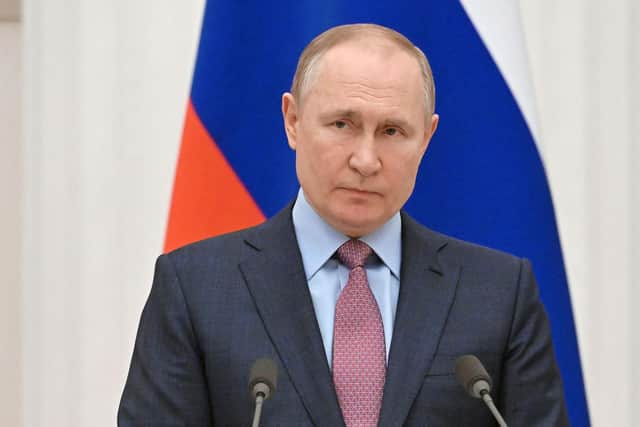Russia-Ukraine conflict: How the West is trying to stay one step ahead in Vladimir Putin’s playbook
“It’s not so much an information war, but a war on information,” Russia observer and author Peter Pomerantsev told an audience at the Edinburgh International Book Festival in 2015, during a discussion on the ongoing tensions between Ukraine and Russia at the time.
Mr Pomerantsev was right then and he still is – yet from the West’s point of view, at least, the conflict is now also a war “of” information.
Advertisement
Hide AdAdvertisement
Hide AdUS president Joe Biden, with the backing of other western leaders including Prime Minister Boris Johnson, has turned WikiLeaks in recent days, declassifying information at a rapid rate to publish details of US intelligence which he says clearly demonstrate Moscow’s plans for war.


In the past few days, Mr Biden has warned of an invasion of the Ukrainian capital Kyiv; raised concerns over “false flag” attacks that Putin would use to justify a war, revealed the build-up of Russian troops along the Ukrainian border and even published expectations of terrorist-style attacks in Russia itself, calling for American citizens to stay away from crowded places such as shopping centres and transport hubs.
His information is specific and targeted – and aims to stay one step ahead of the Russian leader.
Mr Johnson has taken a similar tack, telling reporters this afternoon he has seen “elements of the Russian playbook … starting to play out in real time” and warning that a package of sanctions put together by the West will hit Moscow “very, very hard”.
It is the classic reverse psychology used on toddlers across the globe. If the US president tells the world Mr Putin is planning a direct invasion of Ukraine tomorrow, the last thing Mr Putin will do is invade tomorrow – so he hopes. Yet, as all parents know, toddlers can be remarkably unpredictable.
French president Emmanuel Macron has tried a slightly different tack, taking on the role of the peacemaker. Suffering a drop in popularity due to stringent Covid restrictions and economic woes in France with just a few weeks remaining until the presidential election, Mr Macron’s jubilant announcement on Monday morning he had brokered a summit between Mr Biden and Mr Putin was quickly dismissed by the Russian president.
While Mr Biden publicly announced he had agreed to the meeting – on the proviso that Moscow does not invade Ukraine before it takes place – the Kremlin said it was “premature” to discuss such a summit, adding no “concrete plans” had been made – although a meeting between US secretary of state Antony Blinken and Russian foreign minister Sergei Lavrov is to go ahead on Thursday.
In a further thumbing of the nose to the West, the statement was quickly followed by news Mr Putin had called an emergency meeting of his Security Council to consider a request from the breakaway states of Donetsk and Luhansk in eastern Ukraine to be recognised as independent. International markets, which rose on the hope of peace, quickly fell back again as the day played out.
Advertisement
Hide AdAdvertisement
Hide AdIndeed, Mr Putin’s announcement late last night that he planned to grant the breakaway nations’ requests – combined with an address to the Russian nation heightened tensions further.
For Mr Johnson, struggling with plummeting ratings on home soil amid the ‘partygate’ scandal, the chance has come to make the Churchillian proclamations in the statesmanlike manner in which he occasionally excels. At the weekend, he told us Russia is planning to launch the biggest war in Europe since 1945 by attacking Ukraine in a “bloody and protracted conflict”.
Mr Putin, as is his wont, is also using information to persuade his citizens of his point of view.
The Kremlin insists it is not planning an invasion of Ukraine, while apparently still continuing its exercises along the Belarusian border indefinitely. Russian citizens are being told Ukranian troops have launched attacks on Russian territories, while Kyiv insists that it does not want war.
On the ground, Ukranians being “evacuated” from the Donetsk and Luhansk People’s Republics told The Moscow Times they didn’t know why they were going. Some of them had heard there was shelling going on, but none of them knew who was doing the shelling, or what would happen if they stayed.
State Russian television on Monday deployed its chief war correspondent, who claims 70,000 women and children have been evacuated from Donetsk, amid an “imminent Ukrainian invasion” and reported attacks on civilian infrastructure from the Ukranian side. Yet other observers have noted only a thin trickle of bewildered evacuees.
“We have no idea what’s going on in Donetsk,” one pensioner told reporter Felix Light. “It started to get very loud, lots of explosions. If it hadn’t been for all the noise, we would have stayed.”
Ukrainian foreign minister Dmytro Kuleba has forged his own war of information – on social media, where he has published tweets and WhatsApp messages denying a steady stream of allegations from pro-Russian separatists. These include claims of attacks on Donetsk and Luhansk and shelling of Russian border crossings, as well as reports of the killing of a group of Ukrainain “saboteurs”, who had allegedly crossed the border to stage an attack.
Advertisement
Hide AdAdvertisement
Hide Ad"Ukraine also does NOT plan any such actions,” he said. “Russia, stop your fake-producing factory now.”
A message from the Editor:Thank you for reading this article. We're more reliant on your support than ever as the shift in consumer habits brought about by Coronavirus impacts our advertisers.If you haven't already, please consider supporting our trusted, fact-checked journalism by taking out a digital subscription.
Comments
Want to join the conversation? Please or to comment on this article.
